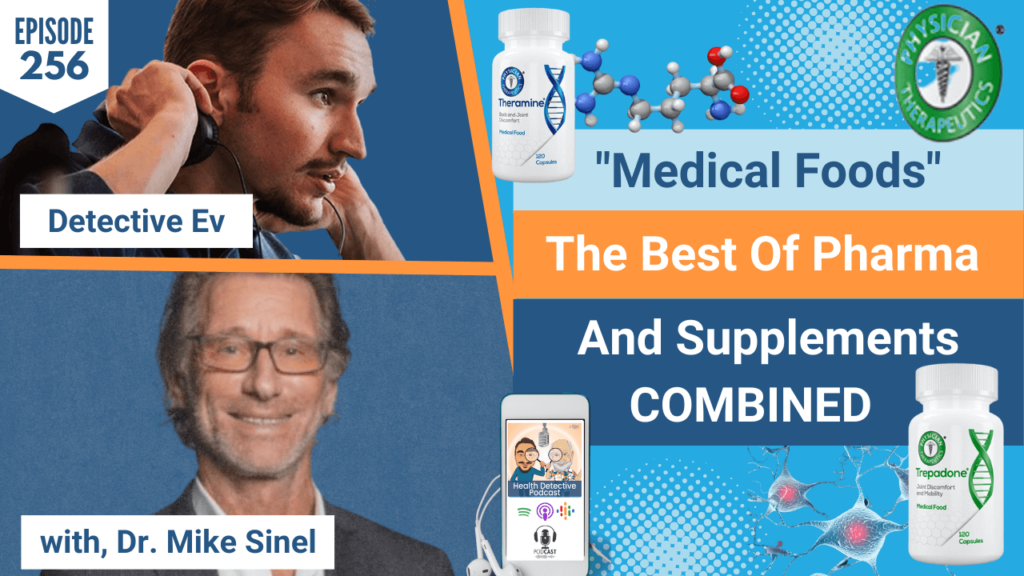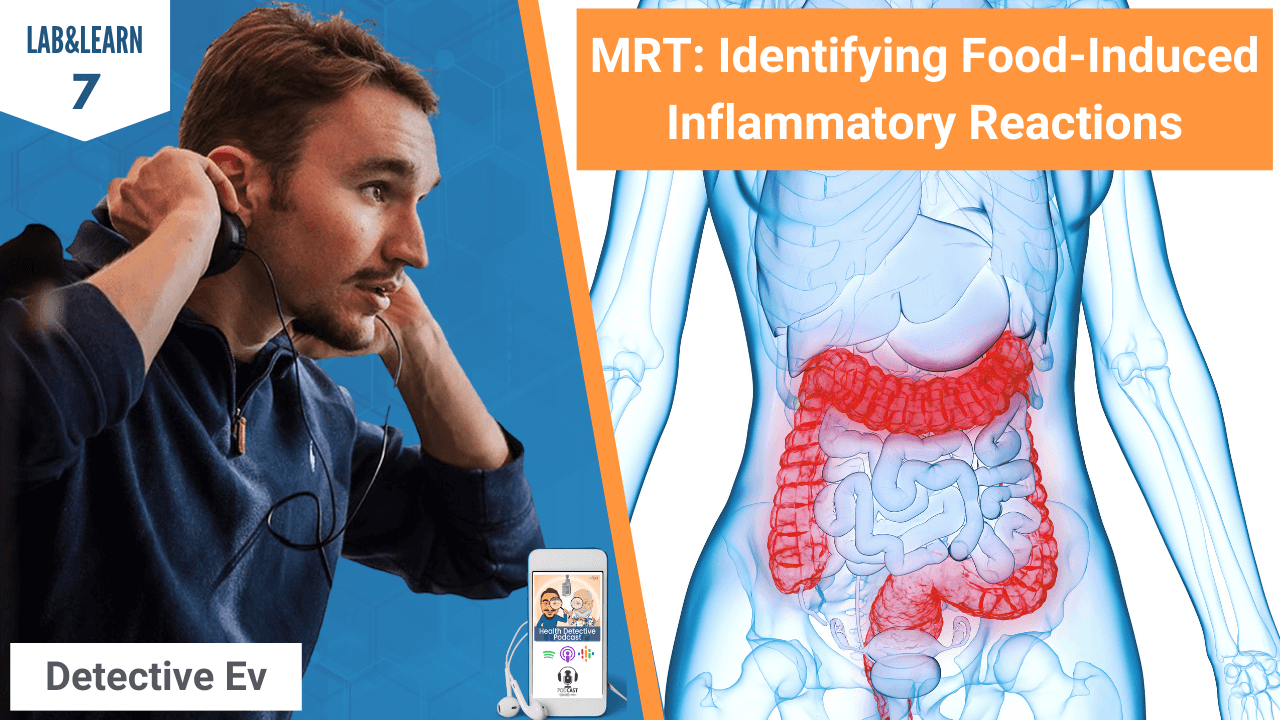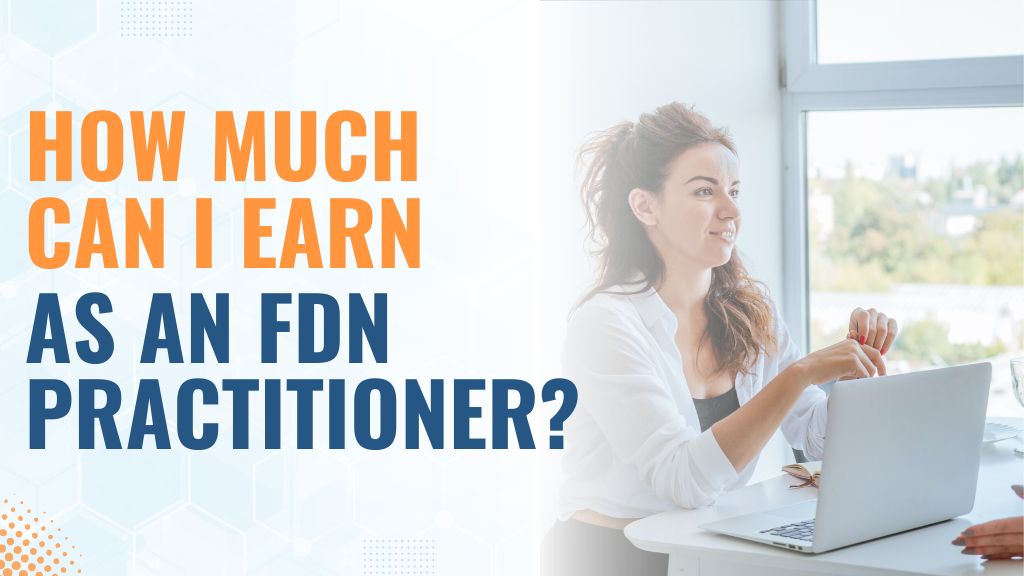Introduction
[00:00:00] Detective Ev: Hello my friends. Welcome back to another episode of the Health Detective Podcast by Functional Diagnostic Nutrition. My name is Evan Transue, aka, Detective Ev. I will be your host for today’s show about medical foods, which admittedly was something that I was not familiar with prior to recording this episode.
It’s not a supplement and it’s definitely not a pharmaceutical. It’s kind of the best of both. You have the regulations and the quality of a lot of pharmaceuticals. And I know that some people are like, well, pharmaceuticals are dangerous. Okay, I fully get that. But the quality, there’s still standards that pharmaceuticals need to meet that allow them to be sold in countries. So, whether or not you like the ingredients is irrelevant, the quality is still there.
But then we have the supplement side and obviously there are many great supplement companies out there. We’ve had a good handful of them on the show. But what people don’t realize is there is no regulations on supplements, at least not in the United States of America. I gotta always be careful with that cause I forget we’re very lucky enough to have a global audience at this point. But our main listeners are still in the USA.
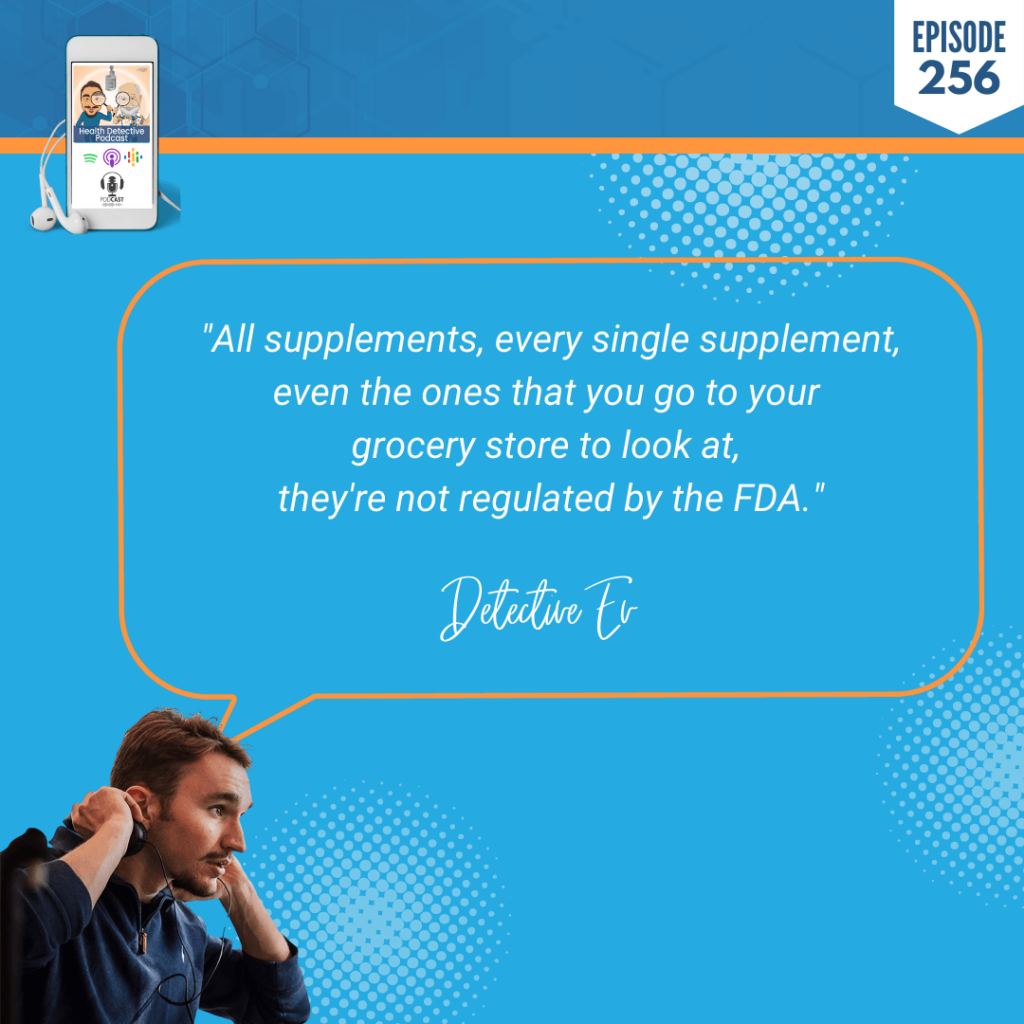
Maybe it’s different in your country, but in the USA, we have something called the FDA, which is the Food and Drug Administration. And all supplements, every single supplement, even the ones that you go to your grocery store to look at, they’re not regulated by the FDA. So, there’s a lot of trust and faith when you’re purchasing these things.
Medical Foods: Physician Therapeutics
That’s why certain supplements might have very similar ingredients, or at least it seems, to others, but they might be double the price. It’s not always that it’s just some waste of money and you’re just peeing it away, it’s that you’re paying for the third-party quality control that they bring in.
You really don’t know what you’re taking unless you have some of the third-party testing. Or in this case, again, you get the best of both worlds with medical foods because you have the FDA regulations, but you have ingredients that any functional practitioner would most likely be right on board with. I’m going to read Dr. Mike’s bio and then we will get into this one today.
After completing his residency at Cornell University Medical Center and Memorial Sloan Kettering in New York, Dr. Sinel served as Director of Outpatient Physical Medicine at Cedars Sinai Medical Center and as Asst. Clinical Professor at the UCLA School of Medicine.
In addition, Dr. Sinel lectured on alternative approaches to pain and the mind-body connection at well-known institutions, including UCLA and the Esalen Institute. As a nationally recognized expert in spinal disorders and pain management, Dr. Sinel also authored several scientific studies and two well-known books on back pain, including Back Pain Remedies for Dummies.
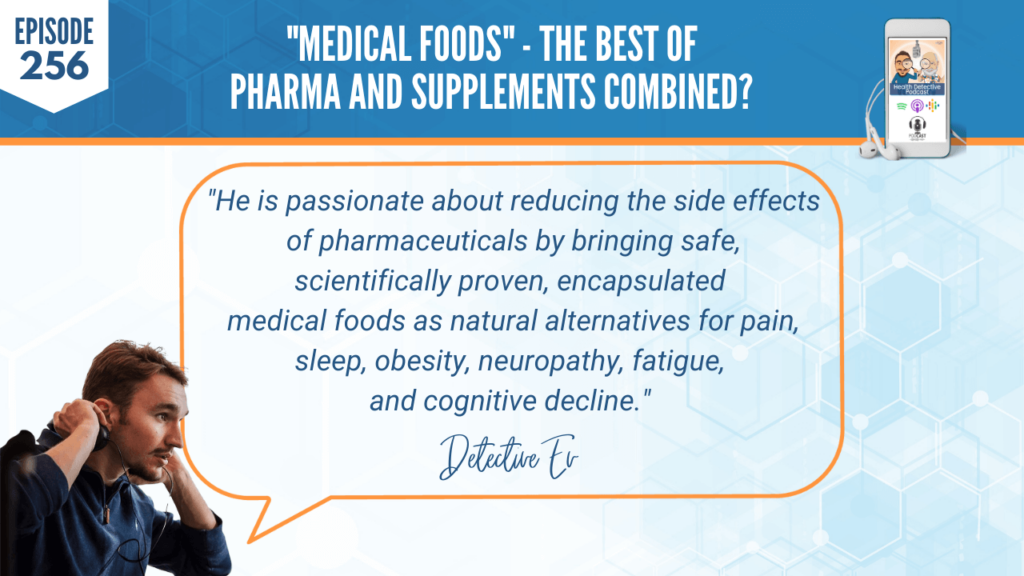
While serving on multiple scientific and business advisory boards in the healthcare sector, Dr. Sinel recently acquired Physician Therapeutics. He is passionate about reducing the side effects of pharmaceuticals by bringing safe, scientifically proven, encapsulated medical foods as natural alternatives for pain, sleep, obesity, neuropathy, fatigue, and cognitive decline.
Medical Foods: Science-Backed
That’s one thing I will add before we jump into this. The science behind what we’re talking about today is really good. It’s really strong to the point that I was surprised. And I hope he doesn’t take offense to this cause I was very interested in what he was saying. Actually, it’s because I was so interested in what he was saying that I was doing this. I was listening to him, and I had the scientific studies up from their website at the same time. And I’m normally someone, if you listen regularly, you know I am fully engaged with the guest.

But some of the things that he was saying, I’m like, how can this not be more widespread? How is this not more well known if it does this? We could spend all day talking about that. That’s probably a separate podcast, if you know what I mean. I’ll just put it this way. The science is good.
I’m super excited about the product and or products. And I think you guys are going to find this one very useful, whether you’re a consumer and you listen to our show or you’re a practitioner and you want to use these things with clients.
Dr. Mike and I also did a video version of this where he had some slides. It is not required at all to understand what we’re talking about today, but it is a minor convenience if you want to go watch it. We do have that on our YouTube. Without further ado, let’s get to today’s episode.
All right. Hello, Dr. Mike, and welcome to the Health Detective Podcast. How are you?
[00:04:36] Dr. Mike Sinel: Great. Great to be here.
Medical Foods: A Specific FDA Category
[00:04:39] Detective Ev: It was cool when Dr. Mike hopped on. I’m like, oh I know this guy. We had been at Biohacking Congress together in Miami. That’s the place to be. It’s a little small of a conference, but it is fun. There’s nothing like talking to some fellow biohackers in Miami. It’s always a good place.
We’ve got an interesting one today. And for those that are listening for the first time or listen not so regularly, the regular listeners will know this. I always like to go into any episode when I’m learning something new or hearing about something new with the perfect amount of ignorance. Just enough that I’m asking good questions, but not so ignorant that I don’t know anything.
This was very interesting to me. I understand that these things can do a lot. I’m particularly interested in the mental health side, but that’s my own bias. There’s a ton of things that we can do here. So, Dr. Mike, I think one of the first things that I wanted to ask, just to define something before we go further today, is what is a medical food. Cause I understand that that’s a pretty big thing of what we’re doing here. It says encapsulated medical foods right there. So how do we define that?
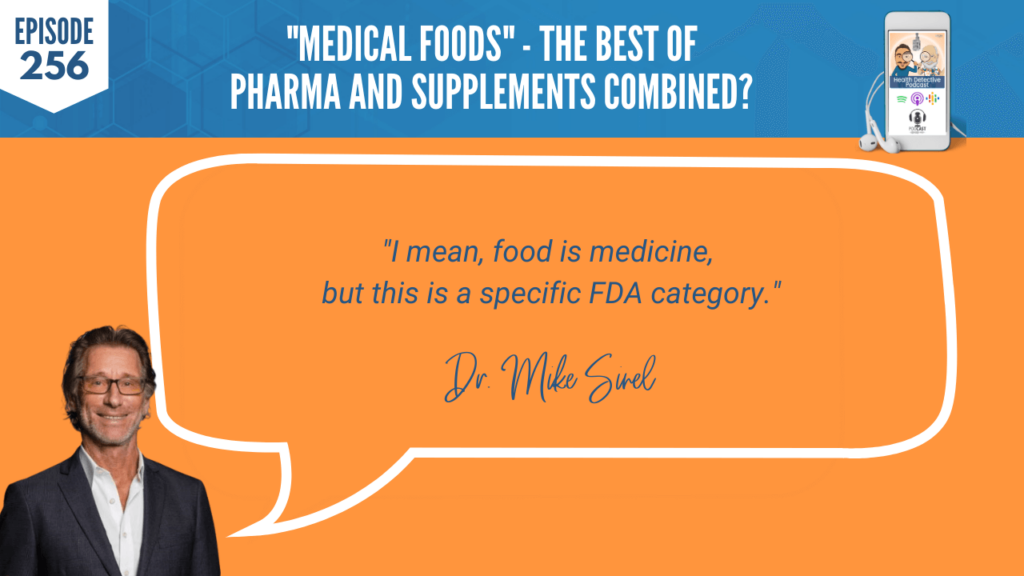
[00:05:48] Dr. Mike Sinel: That’s a great first question because frankly, between you and I, I hate the category name medical food. When I first heard of it I thought it was a bar or a green drink or a powder. Right? I mean, food is medicine, but this is a specific FDA category. And I think the best way for me to explain it is in comparison to drugs, which everyone knows, get FDA approval.
Medical Foods: Designed to Address Nutrient Deficiencies
Drugs are either prescription or over the counter, right? But there are new chemical entities that go through a very long, typically multi-year, five-year or so, approval process, and then require prescription that ultimately become over the counter and generic. And as you know, drugs are associated with a variety of side effects. There are chemicals, right?
Then on the other hand, everyone’s familiar with supplements, which, in the last 30 years and continuing, we see a large growing utilization of. Large populations steer away from pharmaceuticals in hopes that they can manage disease with supplements, which are typically more natural elements.
So, medical foods are not drugs and they’re not supplements. They fall in an FDA category between the two of them. They are specialized formulations that are addressing a nutrient deficiency in a particular disease state that cannot be met through a normal diet.

So, that’s the biggest criterion from a definition is that it’s a specific formulation designed to address a nutrient deficiency, to treat something nutritionally for a particular disease state that you cannot meet through a normal diet. And then the other aspects of the definition are the ingredients have to all be GRAS, which stands for generally recognized as safe. That means you’re dealing with essentially vitamins, minerals, amino acids, and certain botanicals, natural elements. Okay?
Medical Foods: Other Criteria
So, GRAS category, the manufacturing, which is FDA regulated, has to meet a certain standard called cGMP, which is certified GMP manufacturing. That’s a high level of manufacturing. The reason that’s important to note is because the world of supplements is not held to GMP manufacturing. GMP is pharmaceutical grade. And what’s been found over the years is that many supplements don’t actually have in them what is referred to on the label.
If you’re not a certain level of quality of your manufacturing, which is pharmaceutical grade or cGMP, you can’t really know what you’re getting in the bottle. Certainly, there’s many good supplement companies who have very high manufacturing standards, and some do use cGMP manufacturing standards. But there are many, I mean, you could make something in your garage, mix a few powders, call it a supplement, market it and have all sorts of contaminants or inactive ingredients and not even put in what you’re saying is in the bottle. And people don’t really know, cause supplements aren’t regulated in that way.
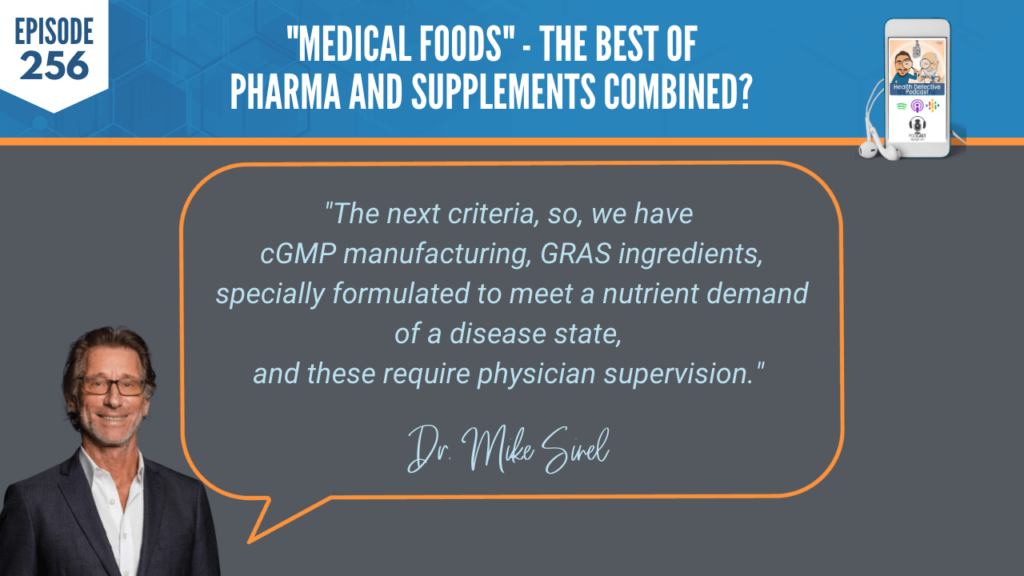
The next criteria, so, we have cGMP manufacturing, GRAS ingredients, specially formulated to meet a nutrient demand of a disease state, and these require physician supervision. That’s an interesting one because essentially, we put it on the label. We have people have their doctor let them know that they can manage the medical food because we don’t want people just stopping prescription medications without consulting a physician if they’re being treated.
In other words, if you have a neuropathy, a peripheral nerve disorder, and you’re treating with Gabapentin, you don’t want to just start our medication Percura, which is not a medication, it’s a nutritional medical food, and just stop your medicine. You want your doctor to control that and slowly wean you off.
Medical Foods: New Owner & New Pricing
These were prescription only products when I was practicing and had a number of clinics that I tried them in. So, I have all these natural products that have big science behind them and clinical studies against big pharmaceuticals. They’re all natural and safe and there are studies on their effectiveness. Yet they don’t have any side effects and they don’t have any drug interactions.
So, they were prescription only and they were being paid for by insurance on average, about $400 a bottle, which was pretty impressive. I did very well utilizing these in my multiple clinics that I had. And then I went on the podium as a UCLA professor, educating doctors. We had thousands of patients around the country doing well, treating problems like sleep, chronic pain and inflammation, neuropathy, obesity, fatigue with these natural encapsulated medical foods.
They were getting reimbursed by insurance. These people were getting often off their prescription medications or reducing them considerably. And I thought this was the greatest thing since sliced bread. Then the story goes that ultimately the FDA came in and said, these can no longer be prescription only.
The medical reimbursement through insurance at $400 a bottle slowly began to disappear in the old company. Well, this company, which is 15+ years old and has a big science team, kept fighting the battle to get Medicare to approve it and insurance to reimburse it, they ultimately went into debt.

I came and bought the company, dropped the prices tremendously. Went out to get these directly accessible to the public with physician supervision but dropped the price to about $60 per bottle retail from $400. Also, I started selling into the practitioner markets.
Medical Foods: A Safe Alternative Natural Solution
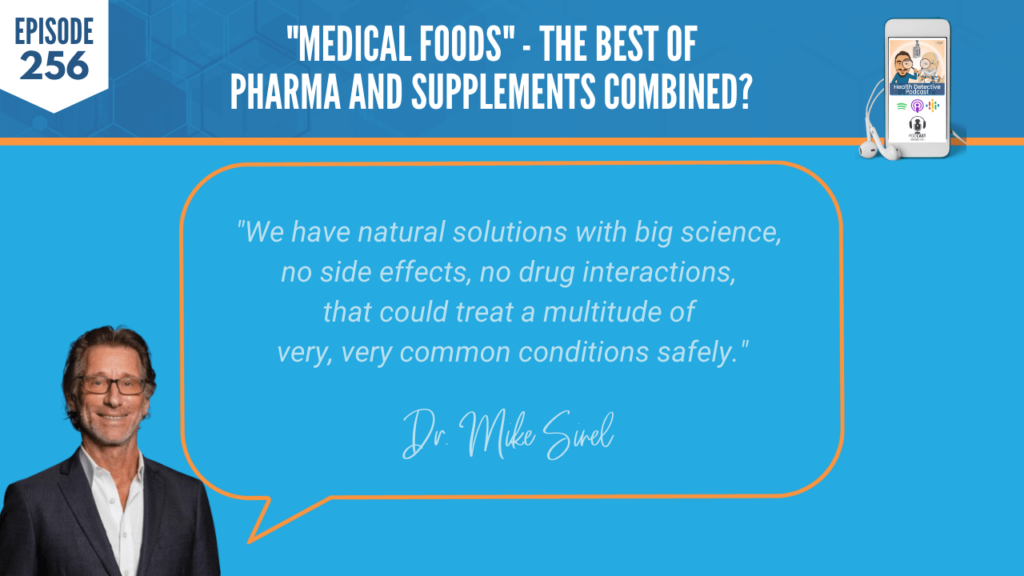
I know you have functional medicine practitioners in your network. So, when me and Reed met, I was like, this is great! Cause we sell a lot to chiropractors, IV clinics, primary care and integrative physicians, many who do functional medicine. That got me excited to bring this to your world. Because we have natural solutions with big science, no side effects, no drug interactions, that could treat a multitude of very common conditions safely.
So, I’m excited to bring it to your practitioners and give them a great revenue model as well. We drop ship, and we could set them up with online web stores.
[00:12:51] Detective Ev: Alright, thank you for that introduction.
It’s funny cause you were answering questions I was coming up with in my head as it happened. I’m like, well, what the heck happened? How did these things not take off a little more?
And I appreciate you bringing to light the aspect of how supplements, not these, but supplements are regulated or the lack thereof with the regulation. Sometimes, I think even our practitioners don’t get this, but it’s mostly the clients that they work with. They’ll be like, well, why do I have to spend this amount of money that’s extra on something from, I don’t know, a company like Thorne versus the grocery store? Like, isn’t it the same? And I’m like, oh my gosh. Not only is it not the same, sometimes it can be downright dangerous.
Dr. Mike Sinel: Yeah.
Detective Ev: Dr. Mike, we had a client recently that we weren’t telling them to go buy it yet. We were just talking to them about something that’s offered by Bio. Botanicals. It was GI Detox. This guy goes and buys it on Amazon.
Medical Foods: OTC Supplements
We don’t know where he got it from. But he keeps coming in, we have an in-person business here, and he kept coming in saying, I feel like this is making my skin worse, because he has some acne. And I’m thinking, GI Detox, if he’s drinking water, if anything, that should help acne, not hurt it. He swore that this was happening.
My girlfriend, she’s an FDN practitioner as well, finally got super smart with this and put on her detective hat. She had him show her the bottle. The bottle looked identical, Dr. Mike. But when you pulled out the capsules from actual GI Detox from Bio Botanicals versus the one he got from Amazon, completely different color. We have no idea what this guy was even taking so we told him to get off of it, of course.
But what Dr. Mike’s saying, guys, is very real. This stuff is not regulated. That company’s going to have no consequences for what they did to our client. It’s scary.
[00:14:31] Dr. Mike Sinel: Yeah, that’s an important point to emphasize. Because even though there are some very good supplement companies, many of them are practitioner only.

Many people go buy supplements over the counter at CVS, and the supplements really don’t have what they portray, have paraffins in them, phthalates, just a lot of toxicity. They have dyes in them just like a lot of pharmaceuticals do. Many of them, you don’t get what they say is in the bottles.
I do take some supplements that I think are physician brands. But the medical foods have a very rigorous science threshold by the FDA. The most unique thing about them is we have clinical trials, double-blind published studies, against some of the most common pharmaceuticals out there.
Medical Foods: Published Double-Blind Studies
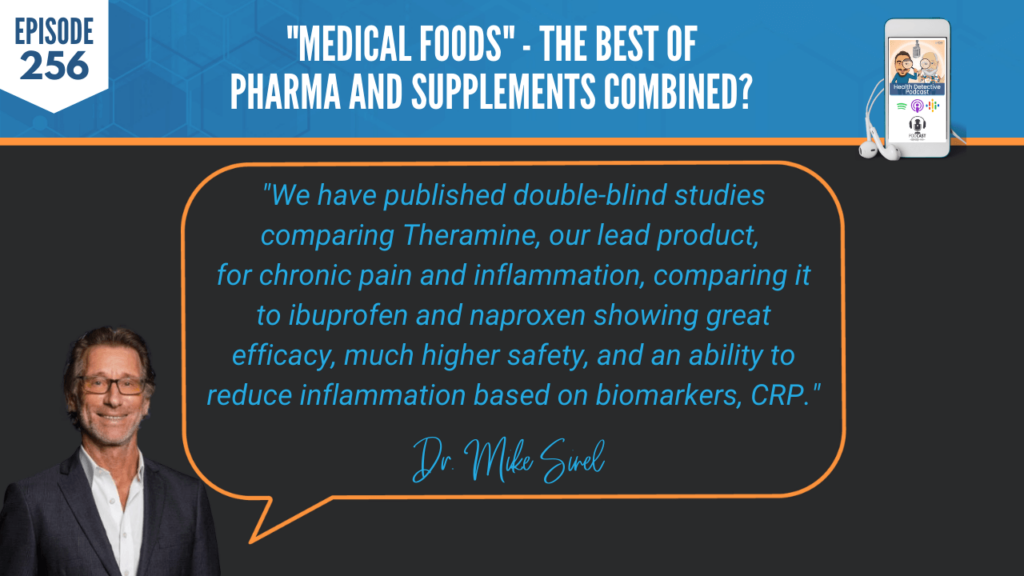
As you know, for pain and inflammation, probably the most common thing used worldwide besides aspirin is ibuprofen, ibuprofen and naproxen, which would be like Advil, Motrin, and Aleve. We have published double-blind studies comparing Theramine, our lead product, for chronic pain and inflammation, comparing it to ibuprofen and naproxen showing great efficacy, much higher safety, and an ability to reduce inflammation based on biomarkers, CRP.
[00:15:54] Detective Ev: Wow! Okay, see, this is what I’m very interested in. Because unfortunately for myself, you know, I’ve always been good with the health side, but Advil was definitely something that worked super effective for me.
So, I got my wisdom teeth out. It was a terrible, weird infection thing, impacted, long story. And I had to take ibuprofen for quite a bit just so I could freaking talk cause it’s my job to be speaking to people. I ended up getting an ulcer from that round of Advil cause I was taking so much ibuprofen all the time. It’s amazing that people just don’t even read the back of the bottle.
My sister, God bless her, I love her to death, but I’m calling her out right now. She’s a nurse for goodness’ sake. I watched her on her college graduation day, from nursing school mind you, throw back 2 Advil before she was going to the party to drink all night. I’m like, what did you go to school for? Are you crazy?
I mean, it’s one thing to do it the morning after, but my God, two of them before you’re drinking. And for those that don’t know or never read the bottle, that actually increases the risk that you’re going to have very severe side effects from that. So, something like Theramine, I’m interested in this.
Medical Foods: Patented Messenger Amino Acid Technology
All right, we have the studies on it. We know that it has a high level of efficacy. And certainly, how could it be worse than ibuprofen? Right? So, it’s definitely safer. What are the ingredients in something like Theramine just to give a picture?
[00:17:08] Dr. Mike Sinel: If you want to pull that up.
While she’s pulling that up, I want to go through something that I think is very important for you to understand about the whole concept of our medical foods.
And Cassandra, I’m looking for the one on Theramine in particular with all the specific ingredients. Not this one. But you could leave this for a second as you’re looking for it.

The concept of how our medical foods are working, this is a patented messenger amino acid technology. And what we’re doing is providing amino acids, which are the building blocks of neurotransmitters. We provide amino acids precursors, as you can see in this slide.
The precursor, which in the example we’re looking at, you could see 5-HTP, which is 5-hydroxytryptophan that makes serotonin, right? Serotonin is one of the neurotransmitters. And neurotransmitters are the signaling molecules from nerve to nerve throughout the body.
Neurotransmitters regulate all our systems in the body where we have nerve junctions. And it turns out that you require at a cellular level, a certain level of neurotransmitters to maintain the body in homeostasis, in perfect balance so the function is optimized.
What we’ve learned is, in all the chronic diseases that we treat, when you have a disease state, let’s just take chronic pain and inflammation, there’s an increased metabolic demand at a cellular level. Okay? So, the cell actually requires much more neurotransmitters in these chronic disease states.
Medical Foods: Producing Neurotransmitters
We have lots of white papers and literature on our website of medicalfoodsinfo.com. It’s proven that there’s a relative deficiency of the neurotransmitter because of the increased metabolic demand associated with the disease state.
Think of it, it’s like a car running efficiently at 55 miles an hour. If it starts going up a massive hill, it consumes more gas because it’s not as sufficient. Or an electric car, your electric draws much more. That’s based on the increased metabolic demand of the cell in the disease, cause it has to work harder to regulate its energy. It does that and requires more neurotransmitters and the neurotransmitters become deficient. The more chronic the disease, commonly, the more, to the degree, might correlate with the deficiency in the neurotransmitters.
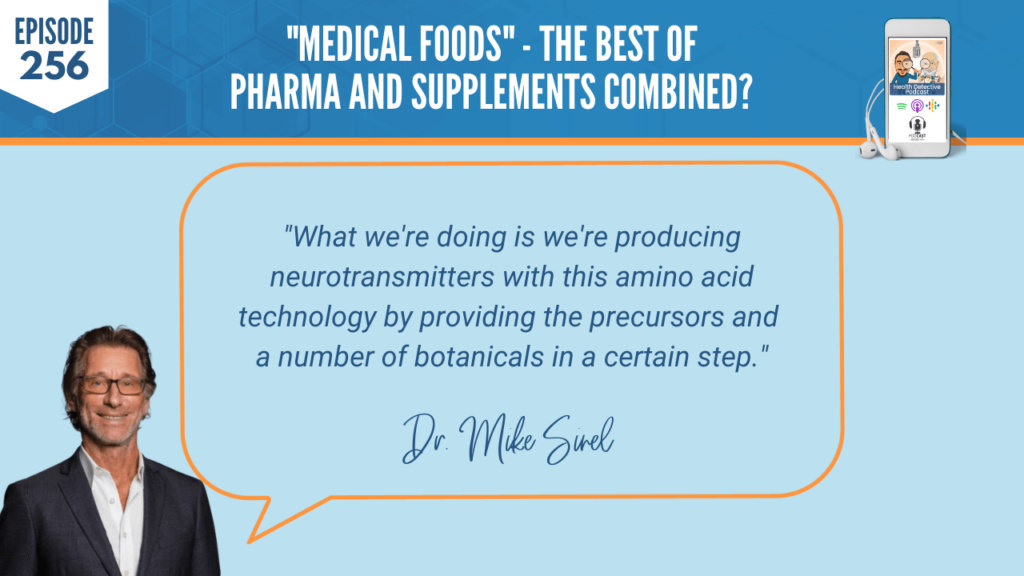
What we’re doing is producing neurotransmitters with this amino acid technology by providing precursors and a number of botanicals in a certain step. This demonstrates the step. We give, example 5-HTP, combine it with some micro doses of cinnamon and theobromine. The cinnamon causes it to get uptaken into the nerve cell.
Then we have something that inhibits the slowing down of it called the adenosine break. We activate the neuron and decrease things that inhibit it, so you don’t get a tolerance with these like you do with many drugs.
But the examples with Theramine, we have things in it that include 5-HTP, which is a precursor to serotonin. We have GABA, which is an inhibitory neurotransmitter and amino acid. Also, we have acetylcholine, we have choline, which is a precursor to acetylcholine through this technology. Acetylcholine also is an inhibitory neurotransmitter. Many of these work to dampen the signals through the spinal cord that are happening in chronic pain.
Medical Foods: Optimizing Cells
So, if you could enlarge that, please. I think she could enlarge it.
So, you’ll see GABA, choline. Arginine is another amino acid, which produces nitric oxide, which has a vasodilatory effect, also an anti-inflammatory effect. We have L-Histidine, which produces histamine.
In all of our medical foods, we have a variety of amino acids and these certain botanicals, like I showed you before. We’ll have theobromine, sometimes have cinnamon, a variety of different botanicals that play a role through our technology to basically regulate the neurotransmitter levels and balance them so that the cell is optimized and can promote natural healing.

What we know in functional medicine, why I was so excited to talk to Reed about this, the whole basis is let’s treat the underlying cause and let’s see what we can manage nutritionally. We all know food is medicine. So, if we could have the cells optimize with their neurotransmitters, they’re going to be in balance and promote natural healing instead of just what many of our pharmaceutical drugs do, which is just treat symptoms downstream.
[00:22:30] Detective Ev: Sure. What Dr. Mike said is accurate. I mean, this is nothing crazy. Half of our practitioners probably take some version of this stuff in a different way. But really, it seems here that you actually have the studies on the dosages it seems, and how to mix them together so that you’re getting a synergistic effect.
Because for example, when we’re talking amino acids, a lot of FDNs I know are on some type of EAA supplement. For those that don’t know that’s essential amino acids. And they genuinely feel good on that. But of course, that’s like the same dose for everything. It’s not meant to actually address any specific conditions.
Medical Foods: Specific Combinations & Patented Technology
I’m honestly finding this fascinating cause I didn’t even know these things existed prior to getting the information for this podcast. I don’t want to go too off track, but I have this question here. I believe you; I mean this more in the big system picture. Are they doing something to suppress this? Why do I not know about this after six years in the space? Cause this seems like an obvious thing to use.
[00:23:22] Dr. Mike Sinel: Yeah. And that’s a big question. I’ll spend a few minutes on it. But let me first finish on what you brought up, which is very important.
Cassandra, you could bring that slide back up.
So, the ingredients, yes, we have clinical published data on all of our specific formulations, which are combinations in milligram doses of these different ingredients with a variety of the botanicals in very specific doses. And that works with our amino acid technologies very specifically, which is patented.
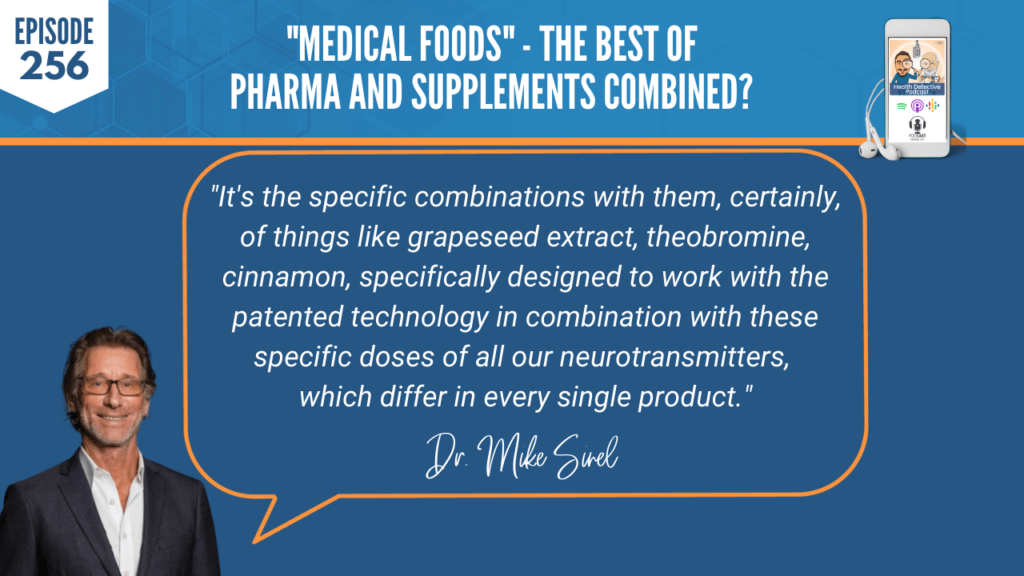
Cause people just go say, well, why don’t I just go buy some GABA and L-Arginine and Histidine, and 5-HTP and choline? I’ll just take those things. You know, it just doesn’t work like that. It’s the specific combinations with them, certainly, of things like grapeseed extract, theobromine, cinnamon, specifically designed to work with the patented technology in combination with these specific doses of all our neurotransmitters, which differ in every single product.
And they often have clinical trials, human clinical trials, double-blind, the gold standard, comparing them to pharmaceuticals, showing perfect safety and strong efficacy. Coming back to your big question, which was my big question, why doesn’t the whole world know about these and why isn’t everyone taking them?
Medical Foods: Too Big of a Battle
The company, which is 15 years old, had some very prestigious doctors, all UCLA professors. Our chief medical officer moved from the older company to the new company since I bought it. He was the Chief Medical Officer of Herbalife, Harvard-trained guy. The prior medical director was the Chief of Rheumatology at Cedar Sinai, another UCLA professor. The scientists behind, they were all part of the initial clinical trials. The scientist behind it was a well-known cardiologist who had a big lab history.

I think the problem was they knew this worked and they had good human data. They didn’t take into account that when you do something like this, you’re sort of going up against big pharma, right? Because we have natural solutions here to so many different problems.
We’re talking sleep, fatigue, cognitive decline, chronic pain and inflammation. We have things that help with anxiety and depression. This is working on how the brain plays a role in pain and plays a role in many diseases. And really, once the FDA came in and said, no longer prescription only and the insurance market dried up, the company just wanted to keep fighting the battle.
Because as you said, they know things like ibuprofen, which many people live on, can be very, very toxic. I mean, when you look at the morbidity, mortality, statistics in population health of things like ibuprofen and Naproxen, look at the incidents of gastrointestinal bleeds and gastritis and cardiac side effects and renal side effects, this is true for many, many medications. So, ultimately these do become a threat when you have natural elements. And ultimately, once the FDA said, no longer prescription only, insurance companies just decided not to pay.
Medical Foods: Combining & Reducing
The old founder and team just kept fighting the battle to get Medicare approval. Which, rightfully so, they should have gotten that. And they should be covered by all insurance companies cause they safely help people and should be first line in every disease with all these symptoms. However, that’s a different battle that could take many years and many, many millions, and it basically ultimately nearly bankrupted the other company.
I came in and said, let me just drop the price to $60, sell them through practitioners, offer them online through my pharmacy to consumers at $60, and sell them to practitioners for much cheaper. I could sell them for $25. You could sell them for $50, still give your patients a big break, get them off pharmaceuticals, and have safe long-term options.
I mean, you can manage arthritis. We have people on these for 8, 10 years safely losing weight, treating chronic pain, treating neuropathy, often getting their medications, taking them off completely or getting them down 50%, 75%. One of our big studies combined naproxen with Theramine and showed you could reduce the dose of naproxen, which is Aleve or naproxin by 70% and get the same effect. When you reduce the dose by 70%, combining it, you eliminate like 95% of the side effects.
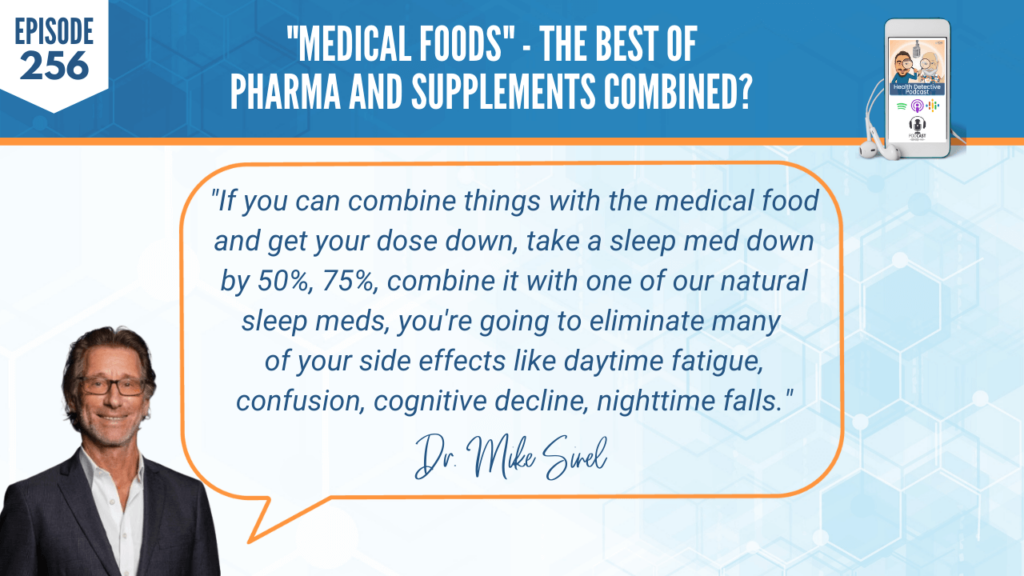
Because you know most of the side effects of a majority of medicines other than allergic side effects, which are rare, most side effects are dose related. So, if you can combine things with the medical food and get your dose down, take a sleep med down by 50%, 75%, combine it with one of our natural sleep meds, you’re going to eliminate many of your side effects like daytime fatigue, confusion, cognitive decline, nighttime falls.
Medical Foods: Comparable Prices
We have two great products for sleep, Sentra PM and GABADone. The Sentra PM was studied against Trazodone, which is one of the most widely prescribed sleep meds on Earth. Again, no side effects, great efficacy, managing the sleep disorder nutritionally. Same for GABADone, works more with sleep disorders with anxiety, and we have many people on two or three of these.
Fibromyalgia patients, I have on Theramine for the pain and inflammation, Sentra PM to normalize their sleep, and then Sentra AM for daytime fatigue. No problem with three meds and often off their other medications.
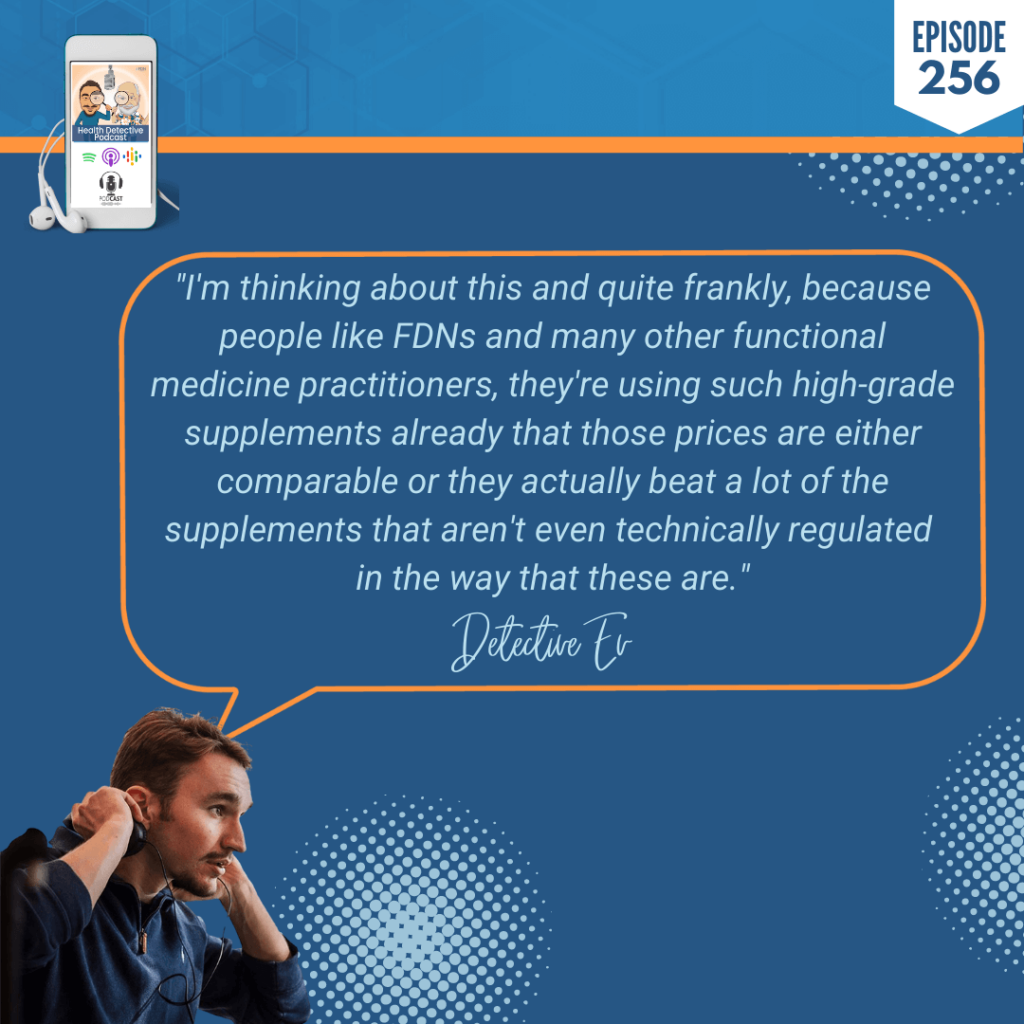
[00:29:19] Detective Ev: That’s amazing! Honestly, I know that you said the price in the beginning, but then you said it again for $60 a bottle. I’m thinking about this and quite frankly, because people like FDNs and many other functional medicine practitioners, they’re using such high-grade supplements already that those prices are either comparable or they actually beat a lot of the supplements that aren’t even technically regulated in the way that these are. And they certainly don’t do things as specifically as these do.
I have a very personal question. One of the things that’s on here, if you’re just listening on audio, there’s a lot of different things that they can help with, but I see sleep disorders and anxiety. And I’m wondering about acute anxiety because I’ve been able to pretty much nail everything. I used to have panic disorder, depression, generalized anxiety, don’t have any of that.
However, the one thing that gets me is I travel all the time. It’s not every time, so it’s good. Man, listen, I just don’t believe we were supposed to be 35,000 feet above the ground. And flying does get me.
Medical Foods: Purely Nutritional Addition
I have a prescription for something I don’t like taking, but I’m not ashamed of it. It’s alprazolam, Xanax. I would love to have a time where I don’t need this at all and still feel okay when I get to the destination. So, I can not take it, but I feel like I just lost a year off my life. But I don’t get into a panic attack, but it’s not fun. Would these work for an acute thing like that?
[00:30:39] Dr. Mike Sinel: They are more generally for chronic because, again, it takes a little while, often, for neurotransmitter levels to increase depending on how deficient they are.
But I would say that we have people respond to GABADone and Sentra PM immediately. And if you could sleep on a flight, get away with GABADone instead of Xanax, it makes perfect sense to try it. You might be able to take half your Xanax dose with GABADone and sleep well. But again, no downside at all.
[00:31:11] Detective Ev: I like that you said that because I won’t tell what the dose is. Let’s just say it’s a dose I’m not proud of. It’s more than 0.5 milligrams, I’ll put it that way.
The reason I thought about it is because you talked about if it could be reduced. This anxiety thing with the planes is more to me than a health thing because the rest of my life, I’m not anxious at all. It’s a circumstantial thing. Anything that can half it sounds good to me.
I know I can nail it one day. I’m doing a lot of things for it, something I’m working on.
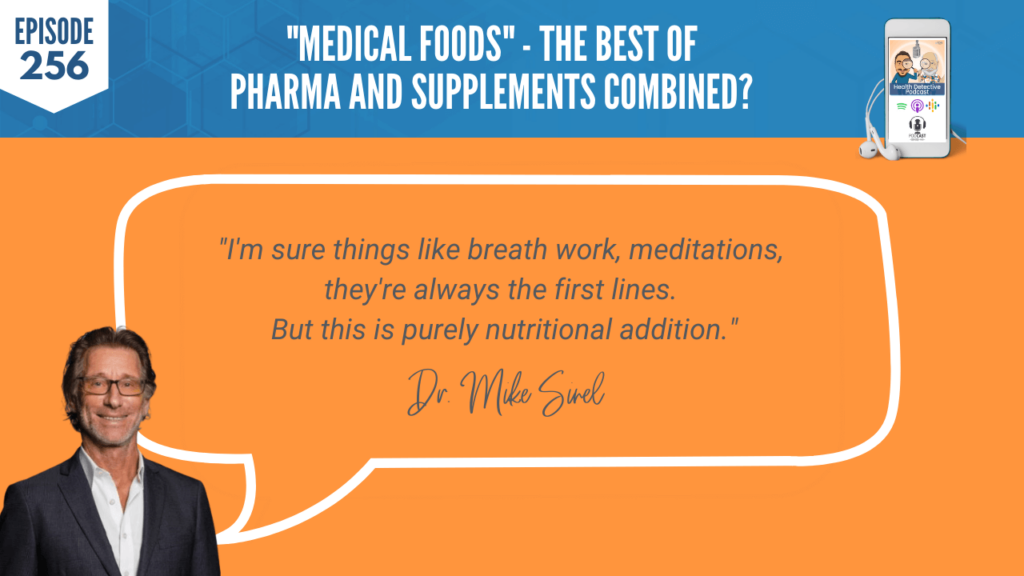
[00:31:43] Dr. Mike Sinel: I’m sure things like breath work, meditations, they’re always the first lines. But this is purely nutritional addition.
Medical Foods: Aligning Philosophically
I tell practitioners like functional meds, we sell to a lot of chiropractors, integrative docs, pain docs, I taught in the med school as a professor at UCLA for 30 years. I have something that’s perfectly safe with no downside risk.
Your functional practitioners all have people probably buying over the counter Advils. And they have a medicine cabinet with supplements and melatonin. These have big science behind them; they’re FDA regulated with big clinical studies. And most supplements work. Again, I’m not here to beat supplements cause I take a handful but most work on theoretical sciences. They don’t have human double-blind studies and ours do. And that’s really what’s unique, you know?

They’re regulating the body to heal naturally by balancing neurotransmitters. And I think that fits philosophically with what every functional medicine practitioner is looking for, which is root cause and getting the body to optimize its natural healing potential.
[00:32:55] Detective Ev: Right. I would normally save this for the end, but I mean, I’m interested, and I know many others are. I might have some other questions outside of this, I’m sure.
You kind of alluded to it already, but what would be the specific model for our practitioners? Cause I mean, the price is no different, honestly, than any of the high-grade supplements that we use. But you got so much more behind it in terms of the science, efficacy, like you said. I mean, it’s a no-brainer to me, so I’m already interested. What would that look like for a practitioner?
[00:33:19] Dr. Mike Sinel: I can tell you what the standards are cause we’re moving a lot now in the chiropractic space and the IV space, and a number of those are functional docs.
Medical Foods: A Safe, Passive Business Model
So, the person would go online and see it reselling for $60. Most of the practitioners are selling them between either $40 or $50 per month, which is pretty cheap. So, it’s a big discount, right? And if you buy bulk, it’s $20, which most do. If you’re buying small amounts, it’s $25. The reason bulk makes sense is, at $20, we also set you up with a customized web store.
We’ll drop ship anywhere in the country to your patients. And your patients, even though they might not be coming in regularly to see you, you know, they may come in every few months, they’re likely ordering these things forever on subscription if they’re working.
We have people losing weight off these for eight years, it’s their main weight loss thing. It’s an appetite suppression. We have people who substitute coffee for Sentra AM for fatigue in the morning and alertness. They just take it every day.
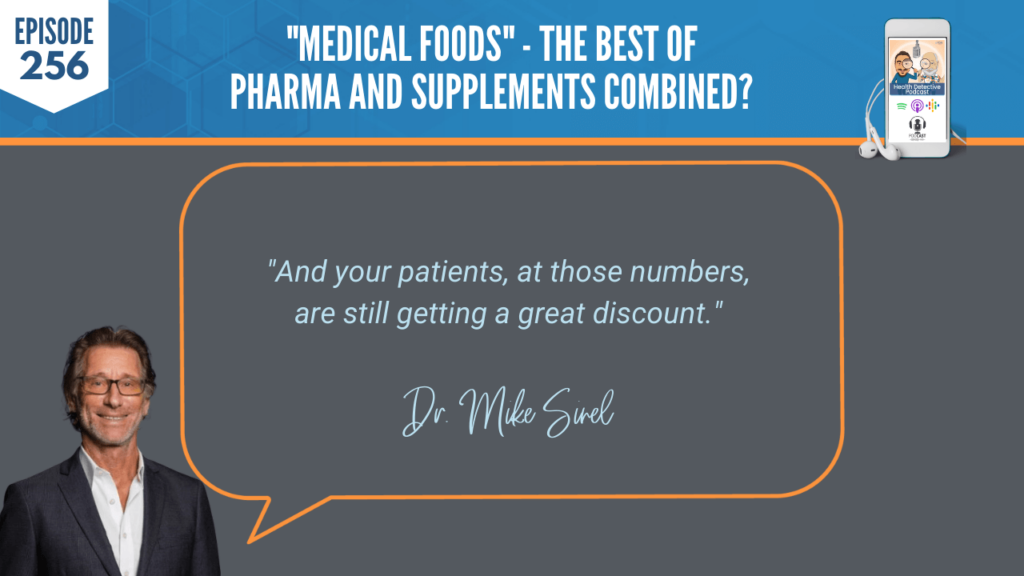
You’d be able to buy these in bulk for $20, have a customized web store where we drop ship. We’ll give you e-blasts to send out. You’re listing them for whatever you want, $40, $50, $60. But $40, you’re doubling your money. $50 you’re more than doubling your money. And your patients, at those numbers, are still getting a great discount.
We also have a program where we will let patients try a first bottle free. That doesn’t really work for Medicare, cause you’re not supposed to. I mean, we could do it, but you’re not supposed to give something that costs more than $15 free to a Medicare patient. But we don’t bill any Medicare here. For a cash practice it’s fine.
Medical Foods: Even Effective for Non-Healthy Lifestlyers
If your patients really wanted to start it, they could go to our website, we could give you a code. They could start, get their first bottle for shipping and handling only. Then if they like it, they could be part of your web store and get all their refills there. It’s really an incredible sort of no-brainer, safe, passive business model while helping people with nutritional medicine.
[00:35:25] Detective Ev: That shows the belief in the product, but it goes beyond belief. I have the website up. Yeah, I haven’t read through the entire studies, but he’s not joking. There’s some really great stuff there. So, I think it’s smart cause you know it’s going to work.
One thing then I’m curious about the studies, I’m assuming the people doing the studies are not necessarily individuals like FDN practitioners that are being super dedicated to this holistic lifestyle.
So, Dr. Mike, the business I have in person, it’s kind of a mad science experiment. I call it a light therapy studio. It’s red-light therapy, specific tanning beds, vitamin D lamps, infrared sauna. So, it’s wacky and I love it.
Now, it’s been a gift and a curse because we have patients that are coming in and really getting a lot of help. That’s a blessing. However, because it’s relatively low cost, I also get people that come in and think that’s all they’re going to do. They’re not interested in working with labs with me, but I still want to support these people.

If these people have conditions and they’re unwilling to change a thing, these products, the medical foods, those studies are done on people that are just still living normal lives, right? And they’re actually still working that well.
Medical Foods: No Drug-Supplement Interactions
[00:36:34] Dr. Mike Sinel: Yes. And these were done by very academic professors who practiced very traditional medicine initially and integrated these into their practice.
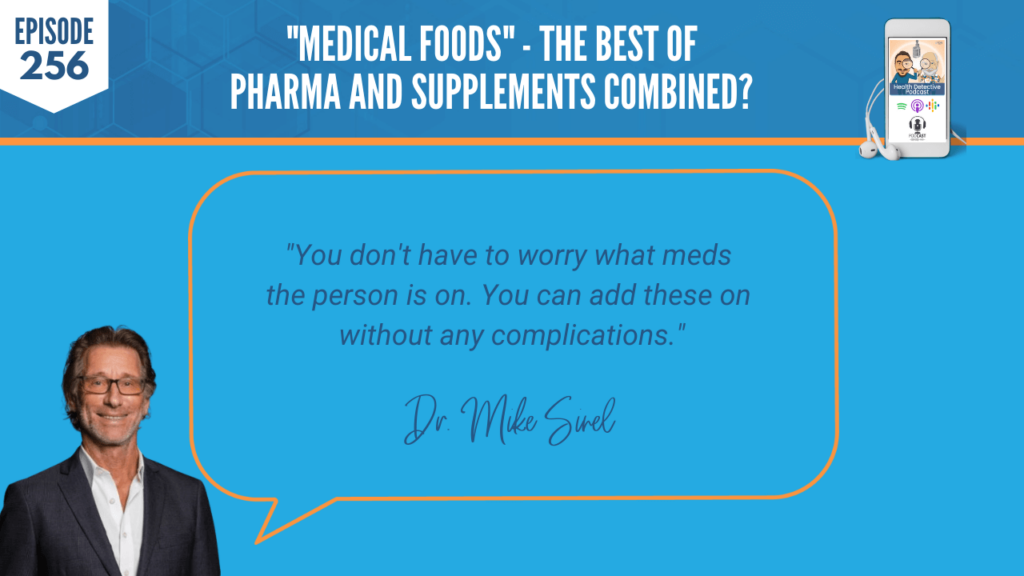
Again, they were prescription only and were being reimbursed $400 by insurance companies. Now we get to bring them directly to all sorts of practitioners. And you don’t have to worry what meds the person is on. You can add these on without any complications.
I tell practitioners, after a month or so try and drop the prescription meds if they’re the prescribing doc, by like 20%, 25%. Every few weeks go down another 25% and see where the patient ends up.
[00:37:14] Detective Ev: This is amazing. Again, I have an understanding of how scary the supplement space is, when people actually know the lack of regulations and the things that can happen. Either way, as FDNs, generally speaking, we’re not people to just throw supplements at something when people aren’t willing to do the work. But this is legitimately different.
I’m already excited to share this with my girlfriend, she’s the one that works in the business with the people that are coming in. And, Dr. Mike, there are so many people that come in that have these specific conditions. They’re in treatment mindset. They don’t want to change.
But I want to help these people. I don’t want them to suffer. Now I can say, okay, you got diabetes, cause we have people like that, you can try this. Just pay shipping and handling, no side effects, no worry about the medication side. Obviously, talk to your doctor, but like you’re good to go.
If you liked it, it worked for you, then we can talk about ordering more. It’s still cheaper than most of the supplements I would recommend.
Medical Foods: A Simple Healthy Intervention
Am I missing a catch or is it just this cool?
[00:38:16] Dr. Mike Sinel: Yeah, I mean, there’s no reason someone wouldn’t try it. Whether it’s to lose weight, get better sleep, chronic pain and inflammation, fatigue, cognitive decline, there’s really no reason cause the safety’s perfect on it. There’s no drug interactions.
And if it helps you have a natural, safe, nutritional solution that’s promoting natural healing, why wouldn’t every practitioner recommend this? You don’t even need any lab tests for this.

And I’m not discouraging people from going down rabbit holes. I’m all for functional medicine myself, a hundred percent. But as you say, some people don’t want the lab tests. They don’t want to get too deep. This is a somewhat simple way to intervene with almost all your patients that have a symptom that’s on our list. It’s a great way to get them started.
A lot of practitioners keep a small inventory in their office, so they give them the first bottle. Then the patients come online for their follow ups. Again, web stores are customized. You’re giving patients big discounts. If you don’t like to keep anything in your office, we could do it all by web stores. Some doctors combine it, so whatever works for you.
[00:39:25] Detective Ev: And that’s the thing, right? The people that work with a lot of clients listening today, they already know this. We would want everyone to live our lifestyle, but we know it’s not realistic. And we have empathy cause most of us have been through our own health crap. That’s why we got into FDN and things like that.
Medical Foods: Balancing the Autonomic Nervous System
Listen, it’s not an excuse to not go do anything else but we all have those family members or friends that, you’ve been doing this for five, six years, they still haven’t budged. This could be a great thing to add in for them.
That’s my major last question. It might provoke a few stories, which is totally cool. I’m very curious about this objective data. There are all these studies, I’ll link them in the show notes so people can read them, that’s the objective side.
But for someone like you who’s been working at this so long, I’m curious about the subjective side. What are some really cool stories? I’m really interested in the mental health side and the pain side. What are some cool stories of people that you’ve heard getting great results with these things, particularly for the mental health or pain?
[00:40:20] Dr. Mike Sinel: Well, just aside for mental health, I want to mention one thing about obesity, because, obviously, half the world’s taking this Semaglutide now. You know, we know what’s going on with prescription meds. Look, I hope they end up safe in the long run.
My chief medical officer, who’s a well-known Harvard trained doc, wrote famous textbooks, and was the Chief Medical Officer of Herbalife, he’s been prescribing these now. He has a very high-end practice in Los Angeles. He’s been prescribing them for 15 years daily with many patients.
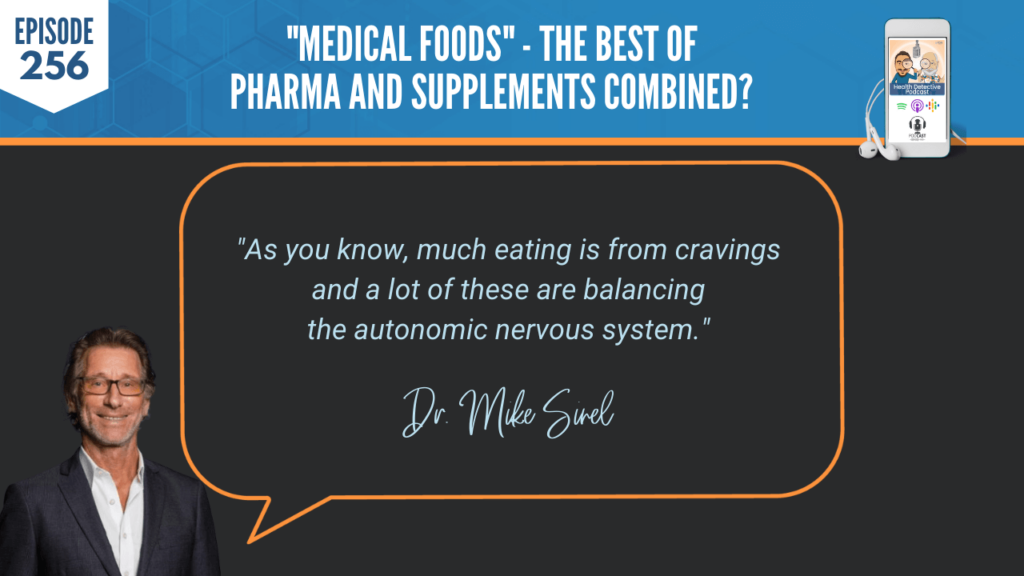
His partner, who is a rheumatologist, lost 120 pounds and stays on App Trim as his appetite suppressant for the last eight years. This decreases craving. As you know, much eating is from cravings and a lot of these are balancing the autonomic nervous system.
Medical Foods: Minimizing Sleep Disorders & Anxiety
It’s important for you to understand how a lot of neurotransmitters work. Most people are dysregulated from an autonomic standpoint. That’s the sympathetic and parasympathetic fight/flight response versus relaxation. Most of us, cause of the technology and the fast lives we live, have a degree of autonomic dysregulation.
Many of these work through helping regulate the autonomic nervous system. Like our appetite suppressant works by decreasing cravings and normalizing mood. Cause when you talk about mental health, we talk about things like anxiety and depression, we are learning more and more how much the gut plays a role, right? It’s the second brain. What we eat affects our moods. There’s an enormous amount of neurotransmitters in the gut so here we’re addressing neurotransmitter levels.

I’ve had quite a number of people get off long-term sleep meds that also serve their anxiety. And just with either GABADone or Sentra PM, managed to get restful sleep. I had a number of people taking Sentra AM for fatigue who realized that we’re usually wired from coffee and more anxious, now have something that makes them more alert and is natural, balancing their cells.
Mental health is such an issue right now and there’s so many different supplement pathways. Again, we have a long-term safety and science on these and we’re working with neurotransmitters. So, I encourage someone who’s anxious and has difficulty sleeping try something like GABADone, you have nothing to lose. We’re glad to send free bottles. Let’s see people have an option. Sentra PM also has been shown to work in depression as well.
Medical Foods: Pain & Inflammation
[00:43:04] Detective Ev: Cool. I got another selfish question really quick, but I know we have practitioners that work with many clients like this. On the screen that I can see, it might be the one for inflammation, we work with a lot of people with severe acne at the red-light therapy studio. Unfortunately, they’re usually younger and unwilling to do the lifestyle stuff, so they’re looking in the treatments. Is there one of these that might be supportive of people like that?
[00:43:29] Dr. Mike Sinel: You know, I would say if they’re not getting off their sugars, which is common, and changing their diets, I mean Theramine, which is our number one product, we have over 30 million doses safely prescribed without significant adverse side effect over 10 years. Theramine is for chronic pain and inflammation, and in our studies, it does show to decrease inflammatory markers. As you know, inflammation plays a role in many, many things. But we don’t have one directed at acne, so to speak.
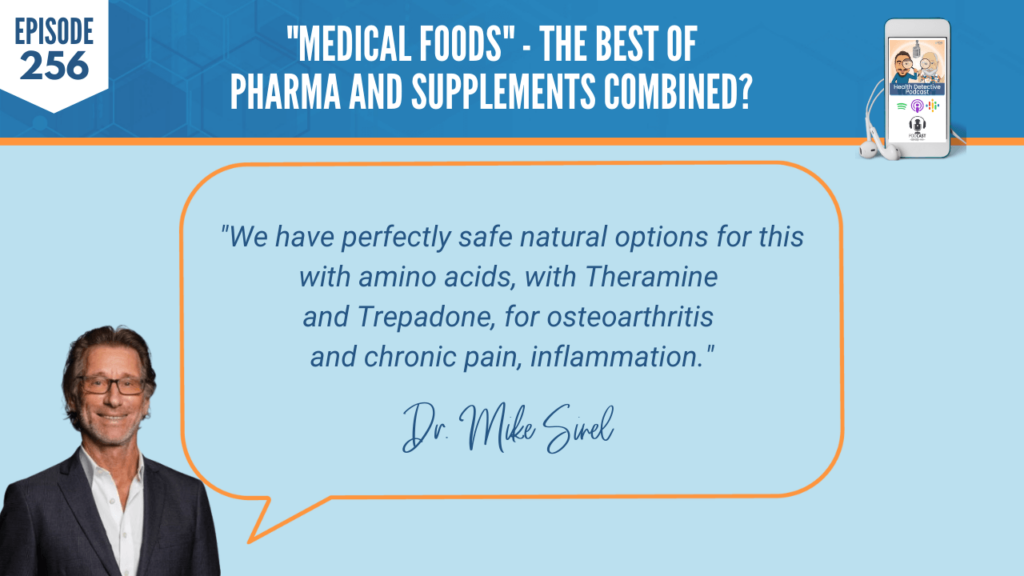
I would just say if there’s some chronic pain associated with it and inflammation that Theramine has been our lead product for many years. And as you know, people with pain, there’s not many options. They take Tylenols, could be tough on the liver, ibuprofens on the kidney, bleeding, gastrointestinal tract. And we have perfectly safe natural options for this with amino acids, with Theramine and Trepadone, for osteoarthritis and chronic pain, inflammation.
[00:44:30] Detective Ev: Dr. Mike, you’re doing a wonderful thing because the second biggest type of person that comes to the studio is pain management, right? Red-light obviously attracts a lot of people that are doing that. We don’t even advertise that, and they just end up finding us.
Medical Foods: There Needs to be An Answer
And so, to be able to say, hey, you know what? You got nothing to lose here; check this out. Pay the shipping and handling. I mean, these people have spent tens of thousands of dollars. Shipping and handling is the least of their worries for no side effects. I mean, you’re right because there’s no good answer to pain. You’re absolutely right.
You’ve got your opiates, acetaminophen, ibuprofen. I mean, these are really serious drugs. People think because you can go to a CVS and buy this stuff, I know the FDNs know better than this, but your clients, guys, think that they can just go to the CVS and because they can buy a bottle of Advil for five bucks, it’s not a big deal. No, it is a big deal. A lot of people end up in the hospital every single year because of the GI stuff.
I always forget this, cause you’re right, it’s even scarier than that because I forgot about the cardiac side, and you brought that up. It’s like people have heart attacks because of these things. There are major issues.

But at the same time, we get it. If you’re in a nine out of ten pain, your life, it’s distracting trying to navigate your life every day when you have that. There needs to be an answer. But it can’t be the ibuprofens and the Tylenols with super high doses all the time. This is brilliant. I’m excited.
Where to Find Dr. Mike & Medical Foods
[00:45:45] Dr. Mike Sinel: I will tell you, anytime you want to do an open webinar with Q&A for your FDN practitioners, because I love answering practitioners’ questions. I mean, we have a very deep website, medicalfoodsinfo.com. Lots of white papers, lots of double-blind published studies.
Medicalfoodschiro.com is another informational one. Medicalfoodsinfo.com. And I’m [email protected]. But I’d love to do any Q&A with any practitioners cause I really think practitioners have to lead this charge for natural solutions to health and using food as medicine in this regard.
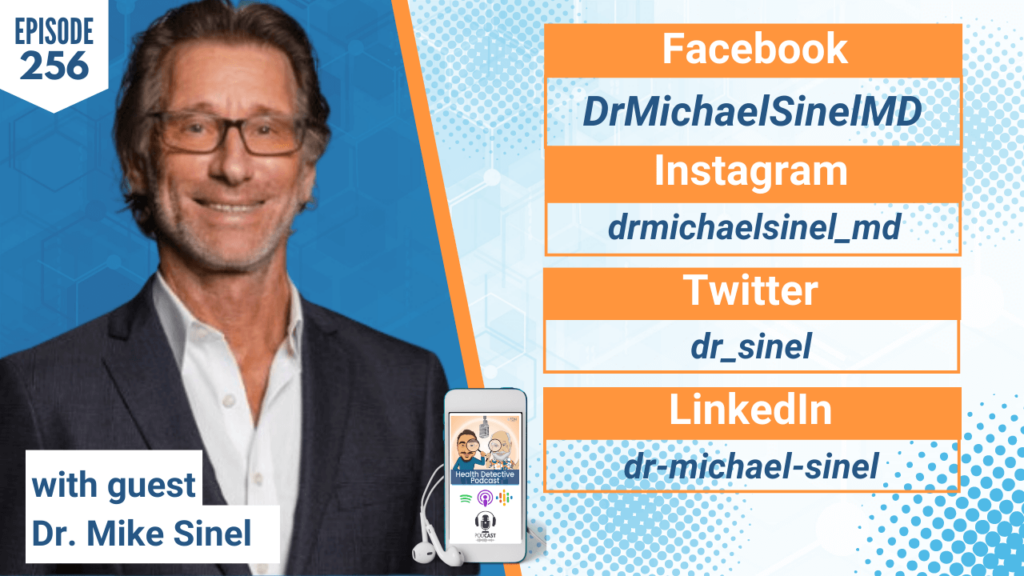
So, I’d really want to continue to educate and give people a nice passive revenue model. Because, as healers, you know, you’re businessmen as well, and this really could work. Even when people move out of state, they could continue to be subscribing to a number of these and you could build up something nice. We had people doing extremely well with this just through passive revenue models, whether in office stores or online or both. So, I’m here to help you.
We have a great easy onboarding process. And Cassandra’s who is with us could get anyone who’d like to set up. Cassandra, can you just show a quick sample in the last two minutes of like what a web store looks like for a practitioner?
And in the meantime, Evan, ask me anything else.
Medical Foods: Demo by Zoom
[00:47:10] Detective Ev: Yeah, while she’s pulling that up, when we are off the recording part, I’ll talk to you real briefly about how we can get you set up in our professionals’ group. That’s a graduate group. There’s about a thousand people in there. They pay to be there. And we love bringing them stuff like this so that’ll be an easy setup. I can get that done for you.
But we have other practitioners that aren’t actually FDNs that listen to our podcast just for the information and stories. I know you mentioned a few links and emails or whatever. If I’m not an FDN and I am interested, I know that we have the medicalfoodsinfo.com, but if they want to become a practitioner for you that can distribute this stuff, is that the same link?
[00:47:45] Dr. Mike Sinel: Yeah. They could go through that one and there’ll be an email. It’s [email protected]. That’s correct, right, Cassandra?
Cassandra: Yes.
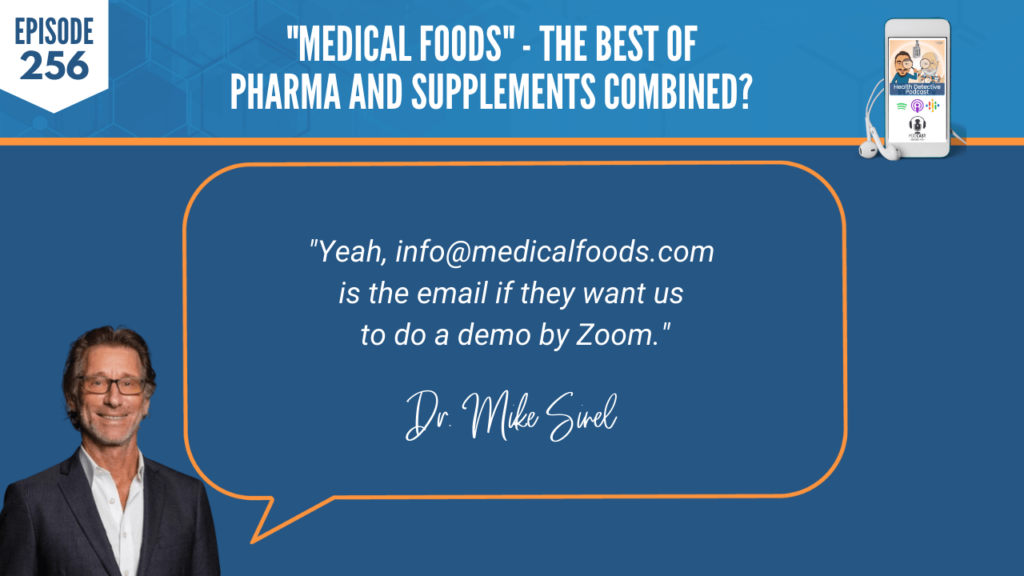
Dr. Mike Sinel: Yeah, [email protected] is the email if they want us to do a demo by Zoom. And they’ll find that on the Medical Foods website, like how to get in touch with us. Cause yeah, we look to set up practitioners every day and really help them have this in their armamentarium to safely treat patients’ diseases naturally.
[00:48:13] Detective Ev: Sweet! I’m on it right now. I’m going to get this done.
Oh, she’s bringing it up right now.
Cassandra: This is an example of a provider web store.
[00:48:21] Detective Ev: Oh, cool.
Conclusion
[00:48:26] Dr. Mike Sinel: Yeah, so it’s just, you know, purchase. And go down a little bit or the other direction, just the front. It’s got frequently asked questions, and this is for chiropractors.

A lot of people, we’ll put their logo up there. Some doctors put a little video up of themselves touting it to their patients. So, we can put a little video up. It’ll have your own logo. It’s your own custom web store. It’s a very turnkey revenue model for people who want to get into this.
[00:48:56] Detective Ev: This looks great.
All right. Well, Dr. Mike, thank you for this today. Again, let’s stay on. We’ll talk about how we can do this in the professionals group. But I really appreciate it.
I’ve done a lot of podcasts. I value every guest that comes on. But I’m taking what was said at face value today because I don’t have any reason not to. And this sounds great. This is one of those things I get excited about. I’m like, oh, this is interesting. So, thank you very much.
[00:49:16] Dr. Mike Sinel: Really appreciate it. Thank you.
You can always visit us at functionaldiagnosticnutrition.com. Our Instagram handle is @fdntraining.
For more informational and functional health-oriented podcasts like this one, go to functionaldiagnosticnutrition.com/health-detective-podcast/.
To learn more about us, go to functionaldiagnosticnutrition.com/about-fdn-functional-testing/.

